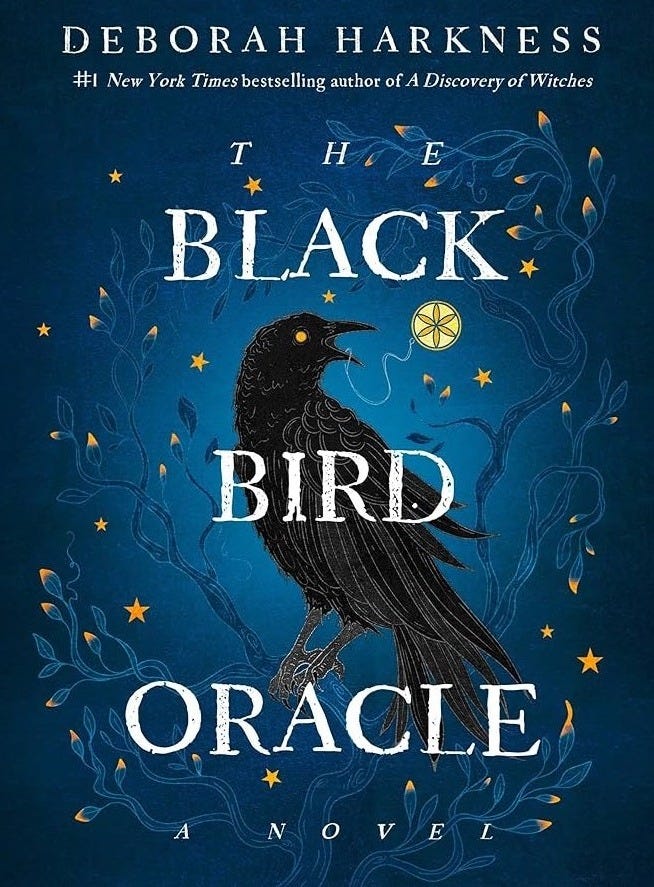I struggle with faith. Not the religious version of it, but the concepts of trust and confidence. I didn’t grow up practicing faith or having models for how to cultivate it. And like some Sisyphean tragedy, I fell in love with writing at the age of eleven, which as everyone knows, has a very straightforward career path requiring zero need for faith. Woof. (If you don’t watch the show Shrinking, I highly suggest you do.)
Writing is more of a calling than a career, and I’m lucky I get to follow it. But it’s not an easy path. The doubt and loneliness can be crushing.
As if being a writer isn’t marginal enough, I’ve also begun embracing my inner witch. I’m still figuring out what that means, whether it makes me feel powerful and deeply connected to the Earth and to something greater to leave offerings on a full moon night, or whether it makes me feel like a lonely weirdo. With both writing and witchery, you can only get what you give, and even then ROI is not guaranteed. Outcomes are impossible to count on and predict. Publishing and spell casting alike require—no, demand—faith.
I need a faith hero.
Thankfully, I’ve discovered a fictional one: the witch Diana Bishop from Deborah Harkness’s All Souls series. In Harkness’s latest book The Black Bird Oracle, Diana Bishop begins cultivating her ability to practice “higher magic,” a talent that’s been hiding in her lineage, waiting for her to discover it. To become an Adept at higher magic, she has to walk the dark path, a literal path of magickal battles that culminates in a labyrinth of tests.
The dark path strains Diana’s faith and resolve. She must first learn that darkness is not something to keep away, but to keep at bay. She has to understand and work with it, not against it. Darkness loves fear, anger, hatred, and doubt. What stumps and disables it is love and curiosity. One of my favorite Diana lines from The Black Bird Oracle is a prayer from the Bible, which she recites after a long and challenging day:
“Sufficient unto the day is the evil thereof”
— Diana Bishop (but actually Matthew 6:34)
In other words, “that’s enough trouble for one day, let’s not worry about what might happen tomorrow.” What I know so far about faith is that it’s both a day-by-day and a long-term thing. On the daily, it requires a certain amount of not looking to the future, taking one step at a time without becoming avoidant or naive about larger issues. To survive long term, faith needs optimism, patience, and stamina. And it should probably be paired with some flavor of apotropaism, because faith opens a person up to possibility, and opening up needs protection.
Faith needs protection, some apotropaic measures.
I try to be mindful of what I’m opening myself up to, who or what I’m allowing to step into my realm of possible realities. There are plenty of folkloric examples of apotropaic measures to ward off evil and bad luck: throwing salt over the shoulder, spitting around a person’s head, hanging horseshoes over doorways, wearing an evil eye. These practices may seem superstitious, i.e. silly, but in my experience, belief and practice go a long way. What matters is that the practitioner believes in the thing they’re practicing, not in how it looks on the outside. Protective measures that have been around for a long time are easy to put faith in, because they have the backing of many people’s faith. But you can also put your faith into something new, something you create for yourself.
I’m working on my own apotropaic recipe for this year, ongoing practices I want to keep as I run my faith-based marathon:
Lower the stakes, and therefore the judgement
Approach things (i.e. publishing, writing, or spell casting) with less fanfare, because fanfare leads too easily to self-criticism. Give my best effort, but be casual about it.Say thank you more
Thank people for the things that they do, or for simply being in my life; thank my dog for existing and being soft; thank myself; or thank no one in particular. Yesterday I thanked a loaf of bread for being gluten free and made of only two ingredients.Reflect before I shape shift
It’s easy for me to conform to people’s projections to make them happy or more comfortable. Ask: how do I feel about myself? after a meeting, phone call, hangout, or dinner date. Do I feel more or less like the version of myself I want to be?Notice when something voluntary feels like a chore
Be curious. Ask myself why? more. Why do I have to do this? Where is the demand coming from?Breathe more
Especially when I’m impatient, frustrated, or hurt.
I can’t predict how these protective measures will help with my sense of faith, but I’m hoping for the best.




There is some great food for thought in here and it’s nice to read something that feels so honest. Plus, there’s some clever and interesting variety to the sentence structure. Keep it up!
Helpful!